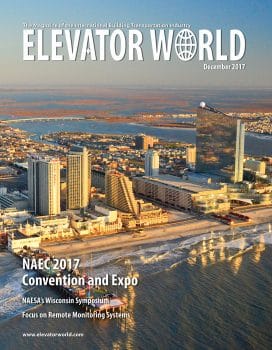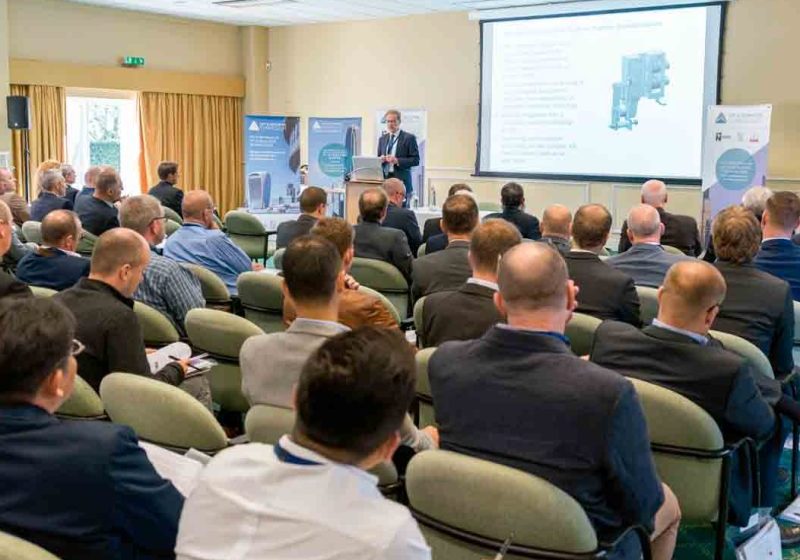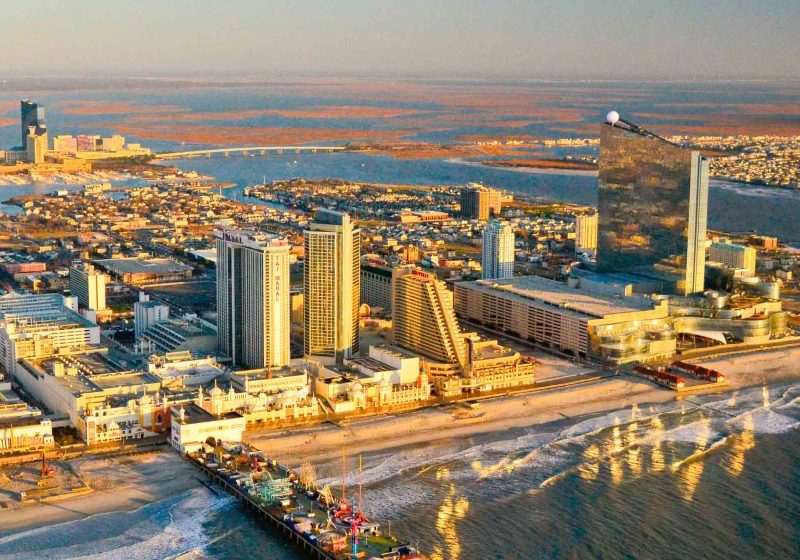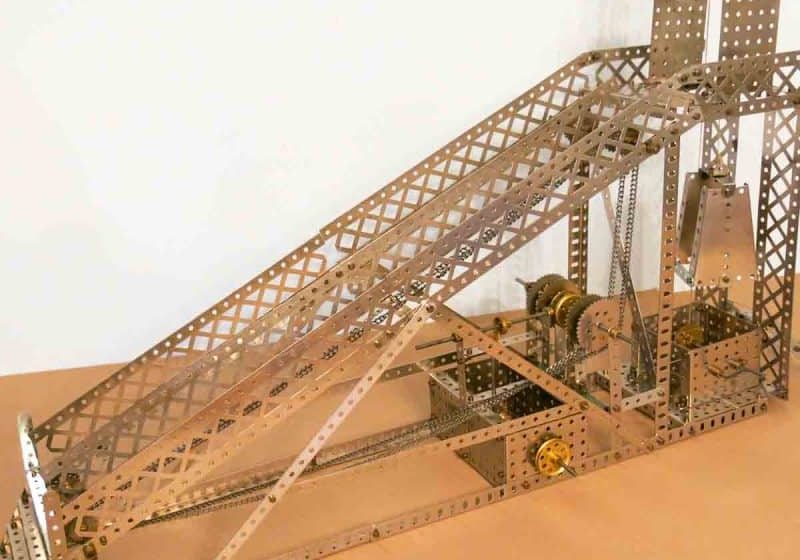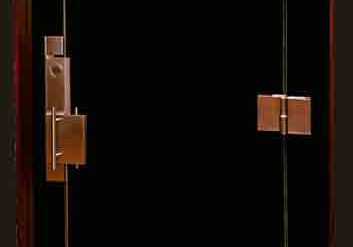Majors display latest developments, supply deal signed, milestone reached and more.
Dec 1, 2017

thyssenkrupp Test Tower, MULTI Cabin
The viewing platform at thyssenkrupp’s now fully operational elevator test tower in Rottweil, Germany (ELEVATOR WORLD, June 2014, December 2014, August 2016 and September 2017), opened in October amid much fanfare. At a height of 232 m, the platform affords guests 360˚ views over the Black Forest and Swabian Alps and is the region’s newest tourist attraction, as well as a “landmark of engineering, progress and innovation,” according to thyssenkrupp. It is the highest viewing platform in Germany. thyssenkrupp AG CEO Dr. Heinrich Hiesinger, thyssenkrupp Elevator CEO Andreas Schierenbeck, Rottweil Mayor Ralf Broß, Baden-Wurttemberg Prime Minister Winfried Kretschmann and architects Werner Sobek and Helmut Jahn were among those who attended the unveiling ceremony on October 7, exactly three years after ground was broken on the 244-m-tall tower.
Together with the elevator manufacturing plant in Neuhausen auf den Fildern and as part of the R&D axis of the university cities of Zurich, Munich and Stuttgart, the test tower is the largest innovation center for elevator technology in Germany. High-speed elevators have been tested there since December 2016, and three of the tower’s 12 shafts are reserved for testing the latest generation elevator system, MULTI (EW, September 2017). Hiesinger called the tower a “future laboratory for a new era in lift technology and an impressive example of innovative power and engineering skills at thyssenkrupp.”
As for MULTI, its cabin earned the German Design Award in the Buildings and Elements category for 2018 from the German Design Council. Boasting impressive shaft views of the revolutionary MULTI technology, the cabin’s design concept was developed by the Junior Professorship in Industrial Design Engineering at Technische Universität in Dresden, Germany, with neongrau behind the lighting and interface. The test tower displays the lightweight, futuristic prototype, which was constructed by Composyst GmbH.
thyssenkrupp explained it wanted MULTI’s cabin to reflect the innovation that went into the ropeless system. Prospective customers said they wanted to see the technology, which thyssenkrupp delivered in the form of “a transparent cabin that allows for grand views into the shaft as well as the entire building.” The use of carbon fibers resulted in a cabin weighing only 300 kg, several hundred kg less than one made of steel. It has a capacity for eight passengers. Carbon fiber is also anti corrosive and allows for greater design flexibility, as reflected in the cabin’s rounded corners. thyssenkrupp noted the cabin’s interior with its operating panel is a “must-see,” as well, observing:
“Its circular display captures the cabin’s horizontal and circular travel directions within the shaft. The current direction of travel is always on display — as are the options to switch floors or cabins in other directions. Though the walls are only a few millimeters thick, the technicians and designers succeeded in discretely integrating aeration, lighting and the sound system.”
A formal awards ceremony is scheduled for February 9, 2018, in Germany.
Otis Launches “Digital Ecosystem” Designed to Enhance Service
Otis is introducing a multifaceted “digital ecosystem” that utilizes digital technology and the Internet of Things (IoT) to enhance its service capabilities, offering customers a “higher level” of personalized service, the company announced in October.
“The service technology we’re developing challenges the industry status quo,” said Tony Black, president, Otis Service. He continued:
“It’s about combining the vast service expertise of our teams with digital innovation to address a potential maintenance issue before it becomes one. It’s about a shared knowledge of equipment health so that our teams arrive on a jobsite with the tools and information they need, and our customers are informed and have peace of mind every step of the way.”
Otis is building on 30 years of experience with connected elevators and data analysis to shape a connected environment. To build this environment, it is investing in:
- Mobility tools and service apps that give the company’s 31,000 lift specialists worldwide instant access to information. Some of these tools connect with customers and passengers, offering more-efficient, informed and real-time service.
- A service system that connects Otis teams and customers – globally – to a 360° view of account information, in order to create a more personalized and informed customer experience.
- Connected IoT systems that enable intelligent and predictive service to address maintenance issues before they occur.
Black explained:
“In today’s urbanizing world, it’s not enough to innovate. We need to evaluate trends in the broader tech landscape and find ways to integrate with those solutions so that we become a seamless part of peoples’ daily journeys and digital touchpoints. That’s the future, and that’s our focus.”
Ales Korotvicka, Otis U.K. service director, expanded on the initiatives:
“Our new digital ecosystem will empower our people to provide customers with more information and improved uptime. All of our 600 U.K. service engineers have iPhones and proprietary apps that allow them to plan their work effectively, with instant information on nearby callouts so they can respond quickly.”
More service-enhancing apps are planned for the near future. Apps to allow engineers to provide instant information to customers on suitable upgrades to their equipment and allow onsite diagnosis of elevator faults and assessments of ride quality will roll out in 2018.
Corning JV to Supply Architectural Laminates in China
Corning Inc. has partnered with Youngy Investment Holding Group to focus on glass laminates for interior architecture applications. The joint venture (JV) will manufacture Corning® Willow® Glass laminates for interior architecture. Corning will supply its glass and glass-laminate technologies to the JV, which will manufacture the panels in Wuhu, China. The panels will be used in residential and commercial applications beginning in China. “Other parts of the world” were also mentioned by Martin J. Curran, Corning executive vice president and innovation officer, adding, “this relationship also opens the door for us to explore additional applications for our thin, innovative glass.”
Corning and Youngy are to collaborate on manufacturing processes and equipment. Corning’s products are used in elevator cab interiors, and its existing elevator-industry partnerships include those with SnapCab (EW, August 2014), National Elevator Cab & Door Corp. (EW, April 2017) and Elevecture. Initial sales are expected for late 2018.
Torin Unveils Millionth Machine for NYC in Shanghai
Torin Drive hosted elevator consultants and contractors from across North America at its global headquarters near Shanghai in September as it presented its one-millionth machine to New York City (NYC)-based TEI Group. The machine will be used in a modernization project at 17 Lexington Avenue in NYC. Festivities began on September 25, when He Zhang, president of Torin, presented the machine and certification to Kevin Lynch, TEI senior vice president. A tour of the Torin factory and dinner followed the unveiling of the machine.
The next day held entertaining performances, dinner and videos on the company’s history and the millionth-machine project. Part of Baruch College, 17 Lexington Avenue received six large gearless TGL2A-4070 Torin machines rated at 3500 lb. at 700 fpm. TEI was project contractor, and VDA was consultant. Its modernization comes after 88 years and emphasizes sustainability: it ultimately aims to attain a Leadership in Energy & Environmental Design Silver designation. The historic building accommodates 4,000 students, faculty, and staff members each semester. After having broken ground in Spring 2017, the first phase of the years-long renovation project is expected to last until January 2020.
T-Systems, Huawei Putting KONE Equipment on the Cloud
KONE has commissioned T-Systems and its hardware and technology partner Huawei to support the connection of more than one million elevators, escalators and building doors to cloud-based services over the next few years, telecompaper reports. Huawei devices will be used to measure parameters and gather mechanical and engineering data, which will be transmitted to the cloud and analyzed. The information will be forwarded to technicians, which will allow them to resolve service issues quicker. T-Systems, an affiliate of Deutsche Telekom, is a longstanding information-technology service partner for KONE. The companies collaborated on KONE’s 24/7 Connected Services, which was rolled out in February to provide real-time data for customers and service technicians.
KONE Restructuring to Result in Loss of 1,000 Jobs
KONE announced a restructuring program in September expected to result in the loss of approximately 1,000 jobs globally as the company consolidates some operations. Expected to generate annual savings of EUR100 million (US$117.8 million) from 2020 on, the program is called Accelerate Winning With Customers and is based on KONE’s Winning With Customers program designed to “bring new levels of customer centricity and value-adding services and solutions.” Details will be directly communicated to those affected. At the end of 2016, KONE had approximately 52,000 employees, so the anticipated cuts will affect close to 2% of its workforce.
Industry Figure: Iran’s Elevator Sector Poised for Growth
The annual turnover of Iran’s elevator industry stands at around IRR50 trillion (US$1.25 billion), while it has the potential to rise to IRR200 trillion (US$5 billion), Mohammad Reza Zohrevandi, president of the Iranian Syndicate for Elevator and Escalator Industries, said. In an October 15 report from the Financial Tribune, Zohrevandi was quoted as saying an average of 45,000 elevators and 1,500 escalators have been installed per year in Iran over the past few years. “From the engineering and technical viewpoint, Iran’s elevator industry is the best in the Middle East, but Turkey is the top manufacturer and exporter of elevators in the region,” he told the source. He further stated that in fiscal 2014-2015, nearly 75,000 new elevators were installed in Iran, which put it in third place behind China and the U.S. Iran’s elevator industry got its start when the first oil refinery was built about 70 years ago in Abadan. Diba Elevator Co., a subsidiary of Schindler, was the first domestic elevator manufacturer.
Get more of Elevator World. Sign up for our free e-newsletter.

